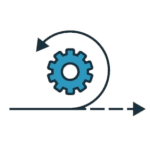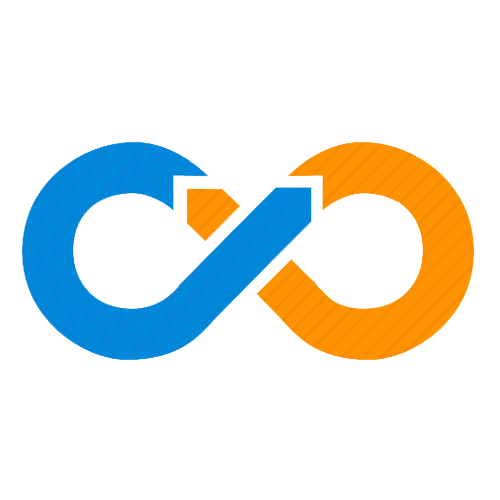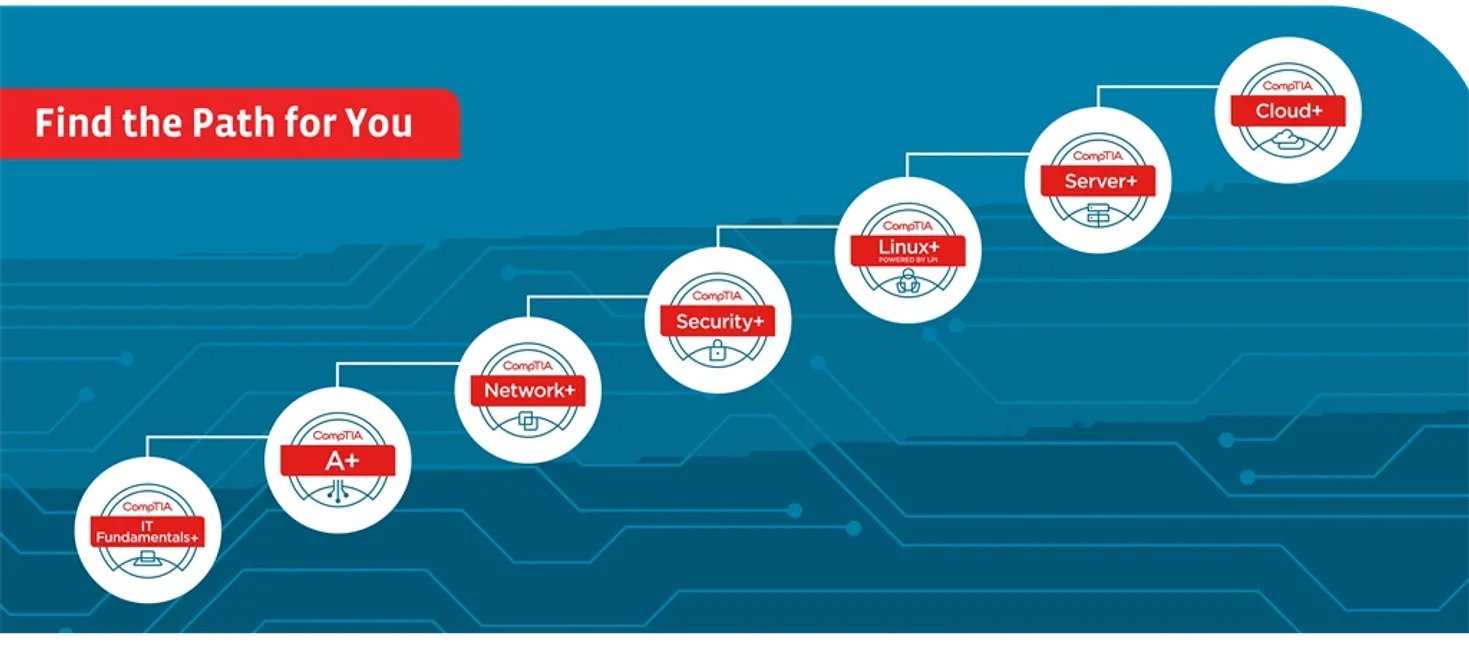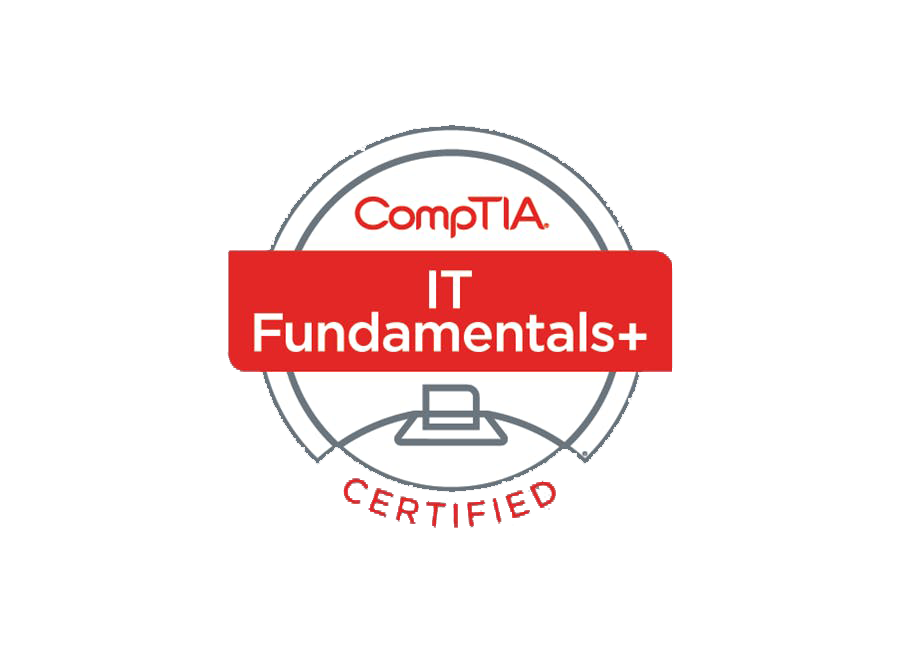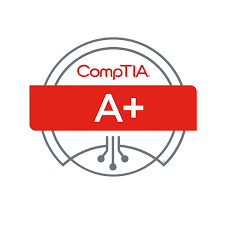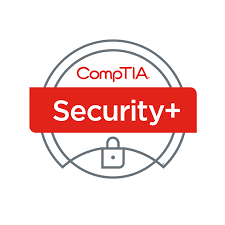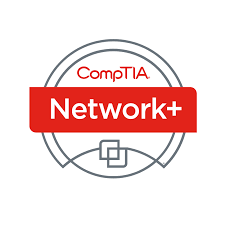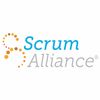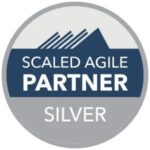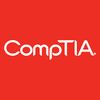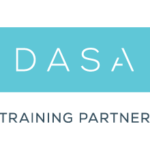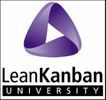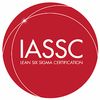Enterprise Training
We offer a suite of enterprise training services that engage and educate your entire workforce around embracing the change that comes with Digital Transformation.
Agile
Foundations
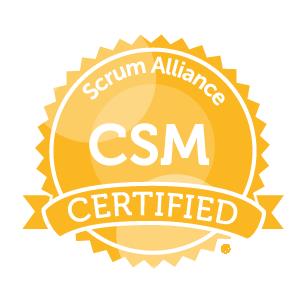
Certified ScrumMaster Training (CSM)
We'll cover the essential concepts and tools of Scrum, highlighting differences between agile processes and traditional "waterfall" methodologies and providing a roadmap for adopting Agile. We'll look into the theoretical basis of Scrum, including Lean and the quality movement. We’ll also cover newer advances such as Kanban, and learn how to apply Scrum to program and portfolio management at scale.
- Lean, Agile, and Scrum
- Scrum Master Core Competencies
- Service to the Development Team
- Service to the Product Owner
- Service to the Organization
Certified Scrum Product Owner (CSPO)
This two-day Scrum Product Owner Training will prepare participants for mastering the most difficult role in Scrum, taught by seasoned experts. Based on broad real-world experience, Acuna Consulting’s training also brings in elements of the Lean Startup® approach that has been adopted by many companies large and small across the world. This approach provides tested and practical techniques for data-based iterative product management within Scrum.
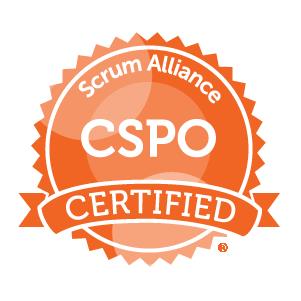
- Product Owner Core Competencies
- Describing Purpose and Strategy
- Understanding Customers and Users
- Validating Product Assumptions
- Working with the Product Backlog
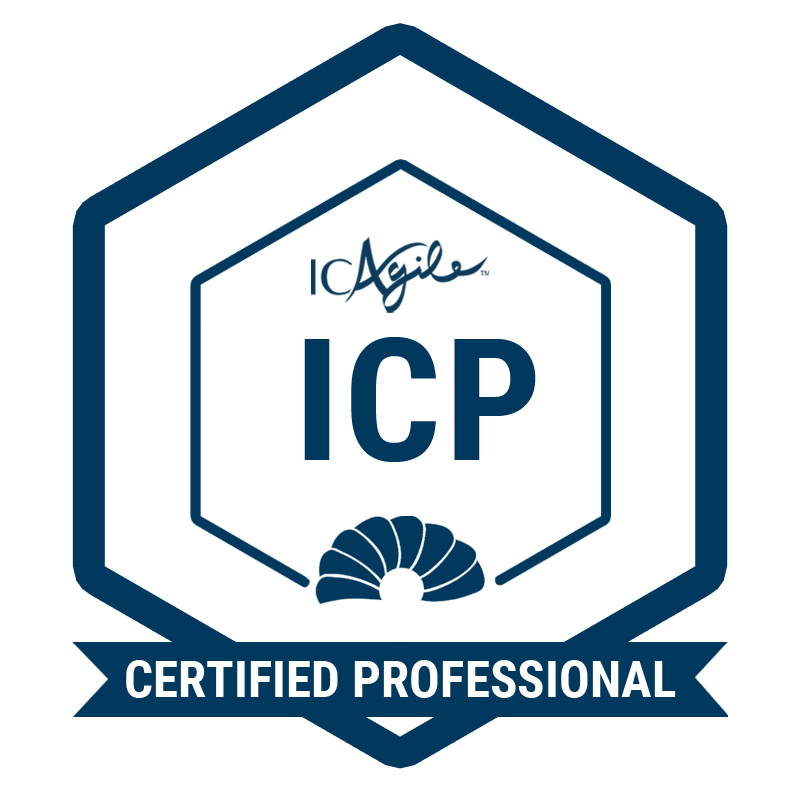
ICAgile Fundamentals (ICP)
The ICAgile Accreditation Program focuses on advancing high-quality agile learning by ensuring courses align with learning objectives as defined by Information Technology industry experts. Agile Fundamentals emphasizes that Agile is a mindset, not a single methodology or framework. In order to succeed with agile, teams and organizations should focus first on “being agile” as a foundation for success in “doing agile.” This track’s learning objectives delve into key concepts such as adaptive planning, value-driven development, progressive elaboration and frequent feedback for continuous improvement as it relates within each IT project. It also covers the history of agile, the agile manifesto, principles, and most widely applied frameworks and practices specific to Information Technology. Students come away with a solid understanding of agile approaches as they prepare to embark on their agile journey.
- HISTORY&MINDSET
- History
- Culture & Mindset
- INDIVIDUALS & INTERACTIONS
- Creating Shared Understanding
- Shifts in Roles
- VALUE-DRIVEN DEVELOPMENT
- Incremental Development
- Work-In-Progress (WIP)
- CUSTOMER & USER INVOLVEMENT
- Including Customers and Users
- Product Adaptation
- PLANNING & ADAPTING
- Planning
- Process & Project Adaptation
Advanced Professional
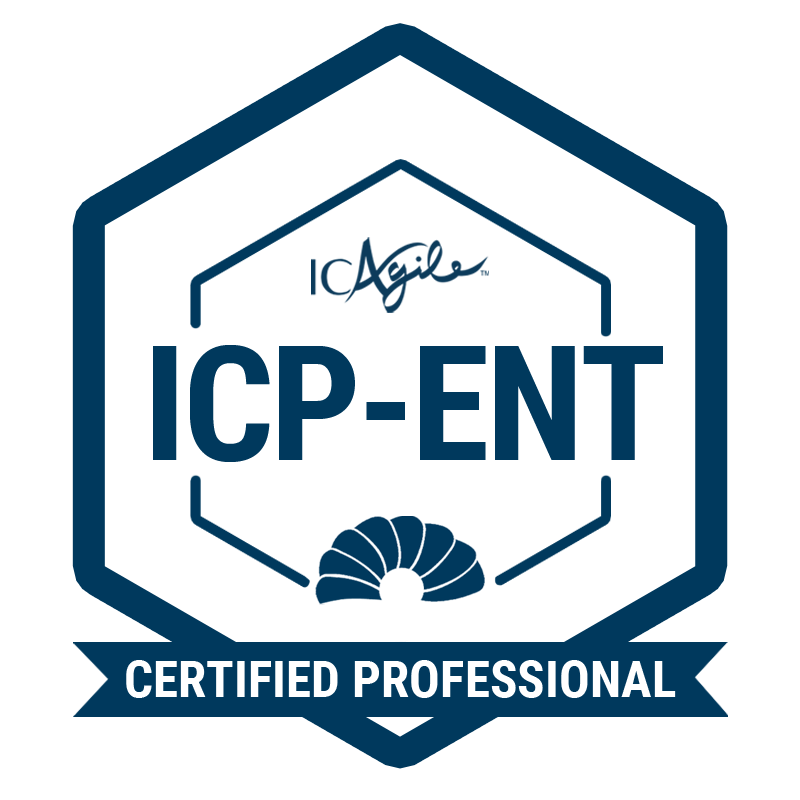
Agility in the Enterprise (ICP-ENT)
The ICP-ENT is an advanced knowledge-based certifications from the Enterprise Coaching for Agility Track. This certification focuses on developing an understanding of agility at the enterprise level from structural, process, leadership, and cultural perspectives.
The Learning Outcomes include topics such as systems and complexity theory, measuring business performance from an agile perspective,
agile frameworks for enterprise scaling, awareness of organizational design and structure, understanding leadership development, and engaging leadership in conversations about organizational culture.
As an advanced path, most courses in Enterprise Coaching for Agility involve a combination of classroom learning, and ongoing group discussions around practical experience in the field.
- ENTERPRISE COACHING SKILLS AND SCOPE
- The Field of Enterprise Coaching for Agility
- Self-Mastery, Professional Development and Ethics
- ENTERPRISE AND BUSINESS AGILITY
- Understanding the Whole Value Stream
- Business Agility
- ORGANIZATIONAL STRUCTURES AND PROCESSES
- Organization Design and Structure</span
- Organizational Processes and Improvement
- LEADERSHIP AND CULTURE
- Working with Leaders
- Organizational Culture and Alignment
- Developing an Agile Team Culture
- CHANGE AND AGILE TRANSITIONS
- Organization and Human Change Processes
- Agile Transition and Transformation Change Strategies
- Working with Organizational Impediments
- Communicating, Educating and Facilitating for Organizational Change
ICAgile Coaching Agile Transitions (ICP-CAT)
The ICP-CAT is the second of two advanced knowledge-based certifications on the Enterprise Coaching for Agility Track. This certification focuses on the field of Enterprise Coaching for Agility, explores the core elements of an agile transformation, and links the core enterprise coaching competencies in a way that empowers coaches to act as agents of change in organizations. The Learning Outcomes also delve into the pursuit of professional mastery and the ethical considerations of Enterprise Coaching for Agility. They then look at elements central to agile transitions such as organizational and human change processes, transformation strategies, addressing organizational impediments, and communicating, educating, and facilitating at an organizational level.
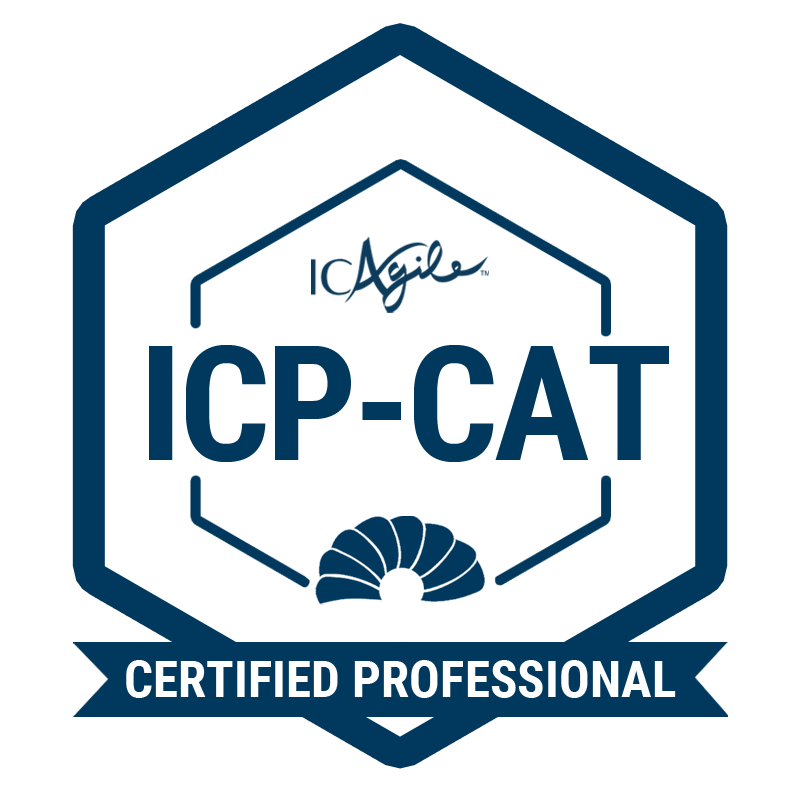
- ENTERPRISE COACHING SKILLS AND SCOPE
- The Field of Enterprise Coaching for Agility
- Self-Mastery, Professional Development and Ethics
- ENTERPRISE AND BUSINESS AGILITY
- Understanding the Whole Value Stream
- Business Agility
- ORGANIZATIONAL STRUCTURES AND PROCESSES
- Organization Design and Structure</span
- Organizational Processes and Improvement
- LEADERSHIP AND CULTURE
- Working with Leaders
- Organizational Culture and Alignment
- Developing an Agile Team Culture
- CHANGE AND AGILE TRANSITIONS
- Organization and Human Change Processes
- Agile Transition and Transformation Change Strategies
- Working with Organizational Impediments
- Communicating, Educating and Facilitating for Organizational Change
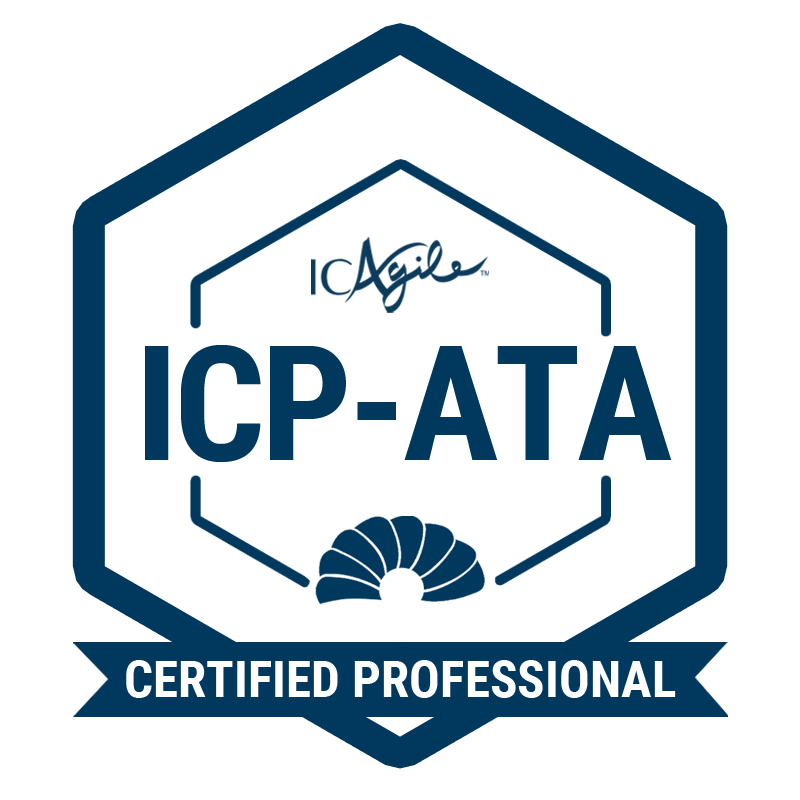
ICAgile Test Automation (ICP-ATA)
The ICP-ATA is one of two knowledge-based certifications on the Agile Testing Track. The certification focuses primarily on test automation from an agile tester’s perspective as opposed to a programmer’s perspective. Students will learn how to set up an overall test automation strategy, including determining which types of tests are better suited for automated versus manual execution. The certification also highlights strategies for creating automated story and feature tests as well as system and integration tests. Because courses are technology- agnostic, participants will write automated tests using pseudo-code in the classroom.
The ICP-ATA is one of two knowledge-based certifications on the Agile Testing Track. The certification focuses primarily on test automation from an agile tester’s perspective as opposed to a programmer’s perspective. Students will learn how to set up an overall test automation strategy, including determining which types of tests are better suited for automated versus manual execution. The certification also highlights strategies for creating automated story and feature tests as well as system and integration tests. Because courses are technology-agnostic, participants will write automated tests using pseudo-code in the classroom. This also helps maximize opportunities for students to learn from one another, regardless of their individual technical expertise. If you are ready to increase your knowledge about the world of test automation, this is the right certification for you.
Typically, training providers will cover the required learning outcomes for this certification in approximately 7 to 10 hours of instructional activities over the course of one or two days.
Agile testers, test engineers, or those aspiring to these roles with a passion for software quality and a desire to learn and practice agile test automation. Test Managers with an interest in learning or improving automation skills and developers with an interest in automation beyond unit testing will also benefit from this certification.
Agile Testing (ICP-TST)
The ICP-TST is one of two knowledge-based certifications on the Agile Testing Track. This certification focuses primarily on agile testing techniques and processes in addition to the mindset and role of an agile tester. Learning outcomes include the ability to distinguish and “agilize” the different types of testing on an agile effort, and understanding how business, development, and testing personnel best collaborate on an agile development cadence. In addition, course participants will learn agile test strategies and techniques related to release planning, testing within iterations, regression testing, performance testing, pre-deployment, and production support testing.
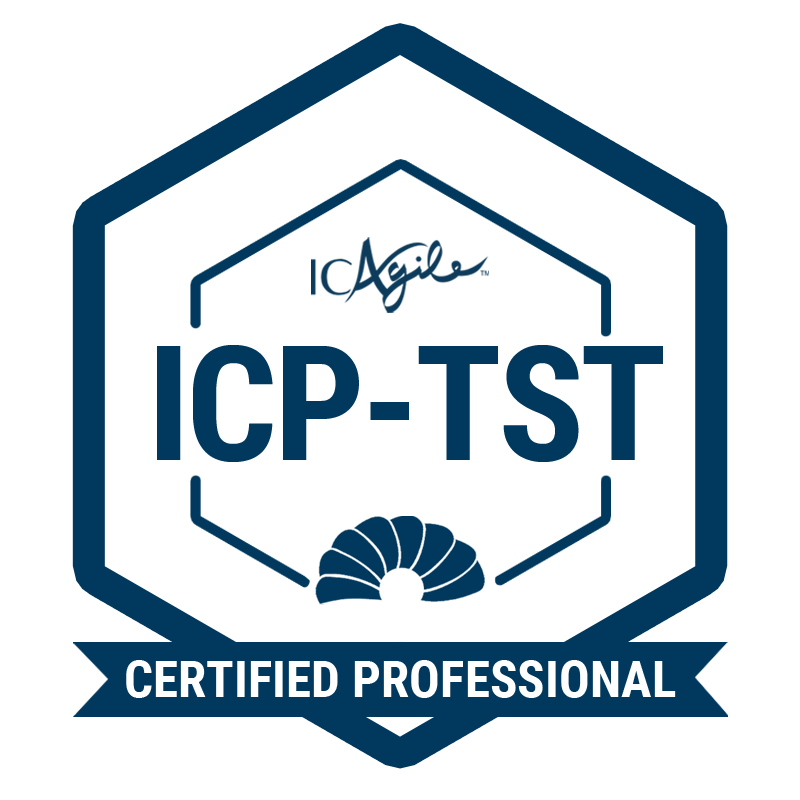
- AGILE TESTING MINDSET
- Overview of Agile Testing
- Mindset & Culture
- TESTING TECHNIQUES
- Categories of Testing
- Collaborating with Developers</span
- Example Driven Development</span
- Feature and Story Testing
- AGILE TESTING PROCESS
- Roles and Responsibilities
- Test Strategy and Planning</span
- Successful Delivery
- Test Environments and Infrastructure
- Working on Distributed Teams
- TEST AUTOMATION
- Test Automation Strategy
- Continuous Integration
- Automating Story and Feature
- Automation Support for Integration and System Testing
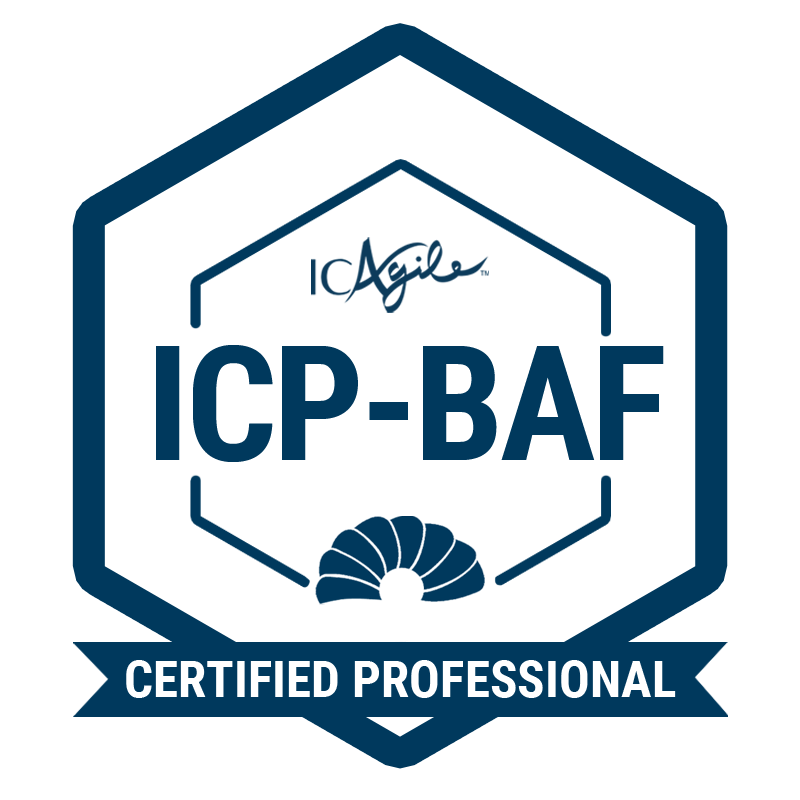
Business Agility Foundations (ICP-BAF)
People at every level and in practically every role in today's organizations are required to focus on customer delight, and bring innovation and continuous improvement into their work. This is a hard challenge and one that requires either building new muscles or limbering up muscles we may not use often. This highly experiential set of learning outcomes equips participants with new knowledge, tools, and techniques to implement immediately. The ICAgile Certified Professional in Business Agility Foundations (ICP-BAF) is intended to jumpstart the organizational and individual transformation towards a more responsive, value-driven reality.
- SETTING THE SCENE FOR BUSINESS AGILITY
- Awareness the Need for Business Agility
- Compelling Vision, Focus and Clarity of Purpose
- ENABLING BUSINESS AGILITY
- New Ways of Thinking
- New and Differentiating Behaviors
- IMPLEMENTING AND SUSTAINING BUSINESS AGILITY
- Frameworks, Tools and Techniques
- Business Agility as the New Normal
PMI Agile Certified Practitioner (PMI-ACP)®
The objective of this course is to ensure that participants acquire the skills and knowledge necessary to pass the PMI-ACP® examination and to successfully apply agile practices in their organization.
Candidates will learn more than the basics of agile project management, understand the underlying principles, skills, and knowledge need to apply Agile practices in real life successfully and to pass the PMI Agile Certified Practitioner (PMI-ACP)® examination. Acuna Consulting’s PMI-ACP® course also provides enhanced learning with real-life examples and case studies and taught by seasoned agile coaches.
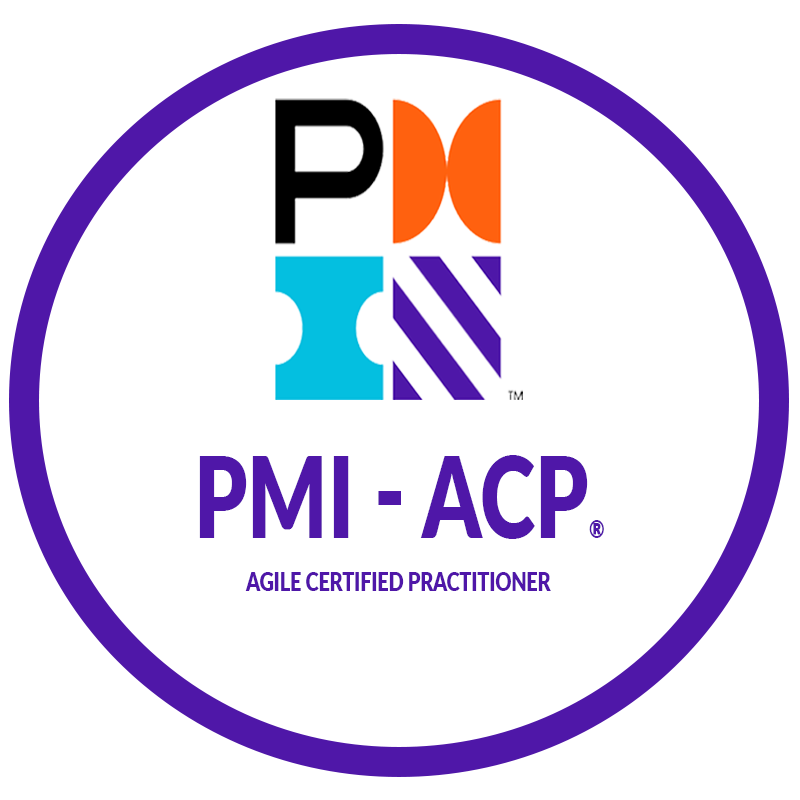
· Professionally apply the knowledge and skills learned in this course
· Understand agile manifesto and principles
· Explain the agile project management framework and life cycle
· Identify and distinguish different agile methodologies
· Practice agile tools and techniques
· Demonstrate the capacity to lead agile project teams
· Apply your knowledge and skills to programs and projects
· Prepare yourself for the PMI-ACP examination
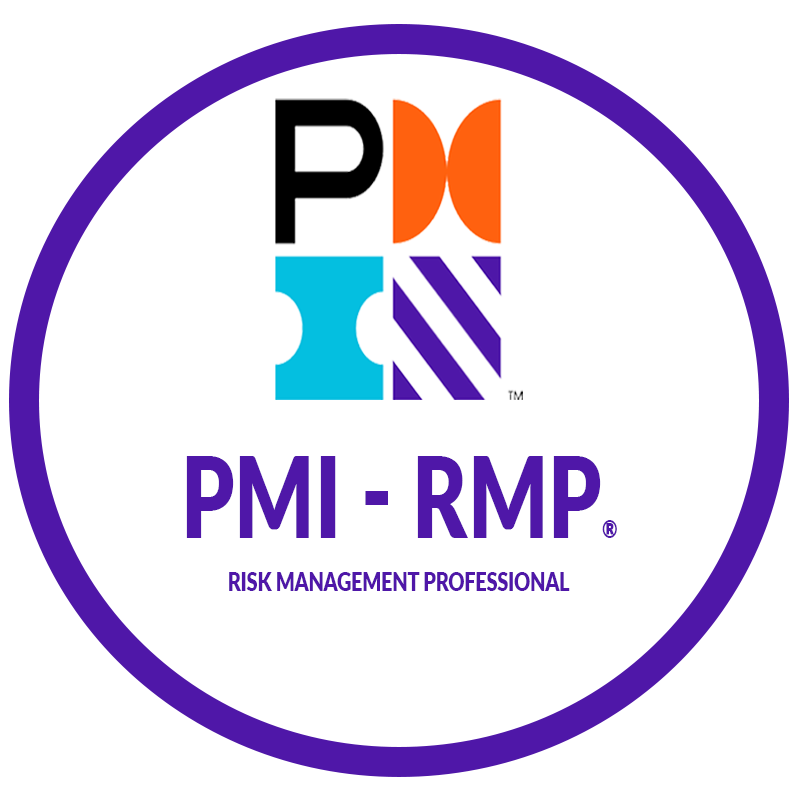
PMI Risk Management Professional (PMI-RMP)®
PMI’s Risk Management Professional (PMI-RMP)® credential is a response to project management’s increasing growth, complexity, and diversity. Globally recognized and demanded, the PMI-RMP fills the need for a specialist role in project risk management. The course concentrates on assessing and identifying project risks, mitigating threats and capitalizing on opportunities, while still possessing a baseline knowledge and practical application in all areas of project management.
If you’re looking to fill the risk management specialist role on your project team, hone your basic project management skills and showcase your specialized expertise to employers, the PMI-RMP credential is for you.
· Gain the skills and knowledge of project risk management based on the PMBOK® Guide and Risk Management Standard
· Learn how to apply risk management tools & techniques in real-world situations
· Understand the risk management framework and risk life cycle; share a common lexicon of risk management terms and principles
· Understand the risk concepts of qualitative and quantitative risk tools and techniques, along with other factors such as prioritization.
· Be fully prepared to take and pass the PMI-RMP® exam.
Scaled Enterprise
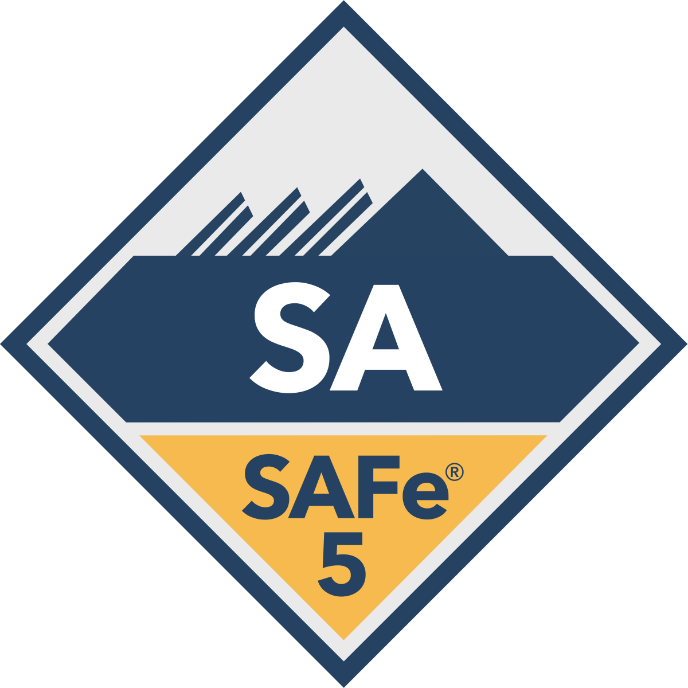
Leading SAFe
Thriving in the digital age with Business Agility with Certified SAFe® Agilist
- Lead the transformation to Business Agility with SAFe
- Become a Lean-Agile Leader
- Understand customer needs with Design Thinking
- Enable Agile Product Delivery
- Implement Lean Portfolio Management
During this two-day course, attendees gain the knowledge necessary to lead a Lean-Agile enterprise by leveraging the Scaled Agile Framework® (SAFe®) and its underlying principles derived from Lean, systems thinking, Agile development, product development flow, and DevOps.
Participants in the class gain insights into mastering Business Agility in order to thrive in the competitive market. They discuss how to establish team and technical agility and organize and re-organize around the flow of value. They also learn and practice the skills for supporting and executing PI Planning events and coordinating multiple Agile Release Trains (ARTs). Participants in the class explore the importance of adopting a customer-centric mindset and design thinking approach to agile product delivery. Learners also develop an understanding for implementing a Lean Portfolio Management function in their enterprise.
Attending the class prepares individuals to take the exam and become a certified SAFe® Agilist (SA)
What you get
Becoming a Certified SAFe® Agilist requires an exceptional range of skills and is a career path for many servant leaders. Certification includes:
- Certified SAFe® Agilist PDF certificate
- Certified SAFe® Agilist digital badge to promote your accomplishment online
- One-year membership to the SAFe Community Platform, which includes access to the SA Community of Practice
- Access to Meetup groups and events that connect you with other SAFe certified professionals
- A variety of learning resources to support you during your SAFe journey
SAFe for Teams
Establishing Team Agility for Agile Release Trains with Certified SAFe® Practitioner
- Apply SAFe to scale Lean and Agile development in their enterprise
- Know their team and its role on the Agile Release Train
- Know all other teams on the train, their roles, and the dependencies between the teams
- Plan iterations
- Execute iterations and demonstrate value
- Plan Program Increments
- Integrate and work with other teams on the train
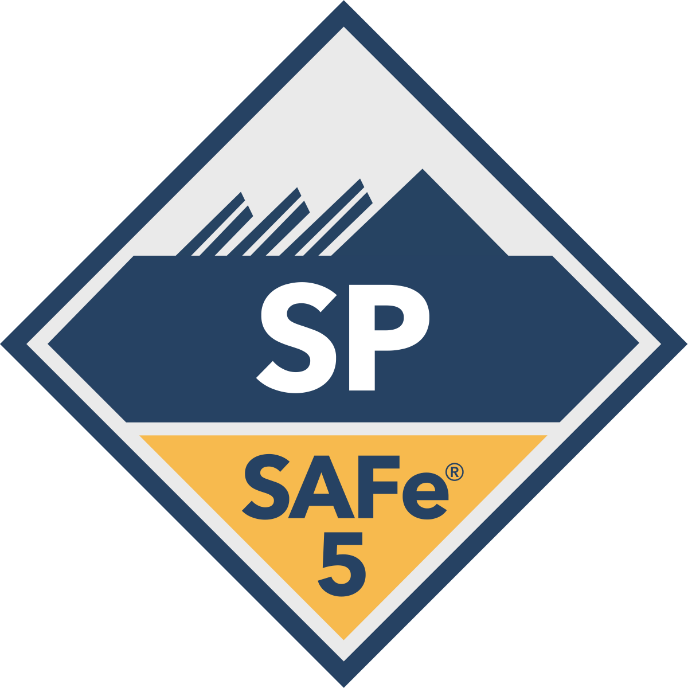
Build the skills needed to become a high-performing team member of an Agile Release Train (ART)—and learn how to collaborate effectively with other teams—by becoming a SAFe® 5 Practitioner.
During this two-day course, gain an in-depth understanding of the ART, how it delivers value, and what you can do to effectively perform your role using Scrum, Kanban, and XP. Learn how to write stories and break down features, plan and execute iterations, and plan Program Increments. Finally, learn about the continuous delivery pipeline and DevOps culture, how to effectively integrate with other teams in the program, and what it takes to continuously improve the train.
What you get:
Becoming a Certified SAFe® Practitioner requires an exceptional range of skills and is a career path for many servant leaders. Certification includes:
- Certified SAFe® Practitioner PDF certificate
- Certified SAFe® Practitioner digital badge to promote your accomplishment online
- One-year membership to the SAFe Community Platform, which includes access to the SP Community of Practice
- Access to Meetup groups and events that connect you with other certified SAFe professionals
- A variety of learning resources to support you during your SAFe journey
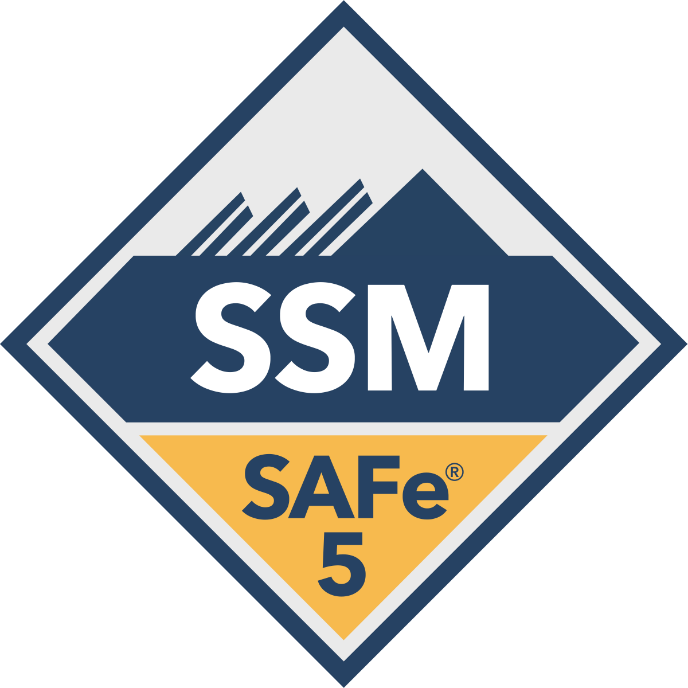
SAFe Scrum Master
Applying the Scrum Master role within a SAFe® enterprise with Certified SAFe® Scrum Master
- Describe Scrum in a SAFe enterprise
- Facilitate Scrum events
- Facilitate effective Iteration execution
- Support effective Program Increment execution
- Support relentless improvement
- Coach Agile teams for maximum business results
- Support DevOps implementation
In this two-day course, attendees gain an understanding of the role of a Scrum Master in a SAFe enterprise. Unlike traditional Scrum Master training that focuses on the fundamentals of team-level Scrum, the SAFe Scrum Master course explores the role of the Scrum Master in the context of the entire enterprise, and prepares attendees to successfully plan and execute the Program Increment (PI), the primary enabler of alignment throughout all levels of a SAFe organization. This includes learning the key components of Agile at scale development, how Scrum is facilitated throughout the enterprise, and how to execute Iteration Planning.
Attendees discover how to build high performing Agile teams by becoming a servant leader and coach, and how to coach those teams to deliver the maximum business value at scale. SAFe 5 Scrum Master (SSM) certification signifies that people are prepared to perform the role of Scrum Master in a SAFe environment, increasing their value to teams and organizations that are implementing SAFe.
What you get
Becoming a Certified SAFe® Scrum Master requires an exceptional range of skills and is a career path for many Scrum Masters. Certification includes:
- Certified SAFe® Scrum Master PDF certificate
- Certified SAFe® Scrum Master digital badge to promote the accomplishment online
- One-year membership to the SAFe Community Platform, which includes access to the SSM Community of Practice
- Access to Meetup groups and events that provide connections to other certified SAFe professionals
- A variety of learning resources to support certified professionals during their SAFe journey
SAFe Advanced Scrum Master
Advancing Scrum Master servant leadership with the Scaled Agile Framework® with Certified SAFe® Advanced Scrum Master
- Apply SAFe principles to facilitation, enablement, and coaching in a multi-team environment
- Build a high-performing team and foster relentless improvement at scale
- Address Agile and Scrum anti-patterns
- Support the adoption of engineering practices, DevOps, and Agile architecture
- Learn to apply Kanban eXtreme Programming (XP) frameworks to optimize flow and improve the team’s work
- Facilitate program planning, execution, and delivery of end-to-end systems value
- Support learning through participation in Communities of Practice and innovation cycles
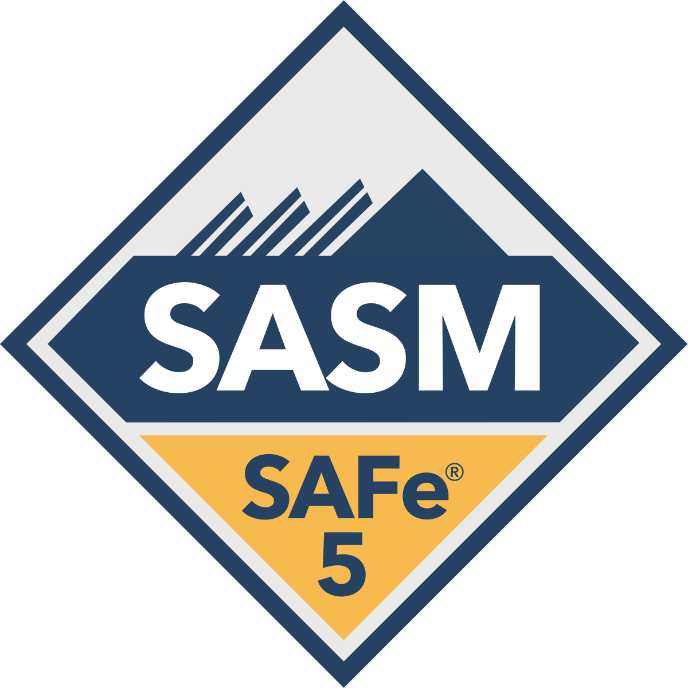
This two-day course prepares current Scrum Masters for their leadership role in facilitating Agile team, program, and enterprise success in a Scaled Agile Framework (SAFe®) implementation.
The course covers facilitation of cross-team interactions in support of program execution and relentless improvement. It enhances the Scrum paradigm with an introduction to scalable engineering and DevOps practices, the application of Kanban to facilitate the flow of value, and supporting interactions with architects, product management, and other critical stakeholders in the larger program and enterprise contexts. The course also offers actionable tools for building high-performing teams and explores practical ways of addressing Agile and Scrum anti-patterns in the enterprise.
What you get
Becoming a Certified SAFe Advanced Scrum Master requires an exceptional range of skills and is a career path for many scrum masters. Certification includes:
- Certified SAFe® Advanced Scrum Master PDF certificate
- Certified SAFe® Advanced Scrum Master digital badge to promote the accomplishment online
- One-year membership to the SAFe Community Platform, which includes access to the SASM Community of Practice
- Access to Meetup groups and events that provide connections to other Certified SAFe Professionals
- A variety of learning resources to support certified professionals during their SAFe journey
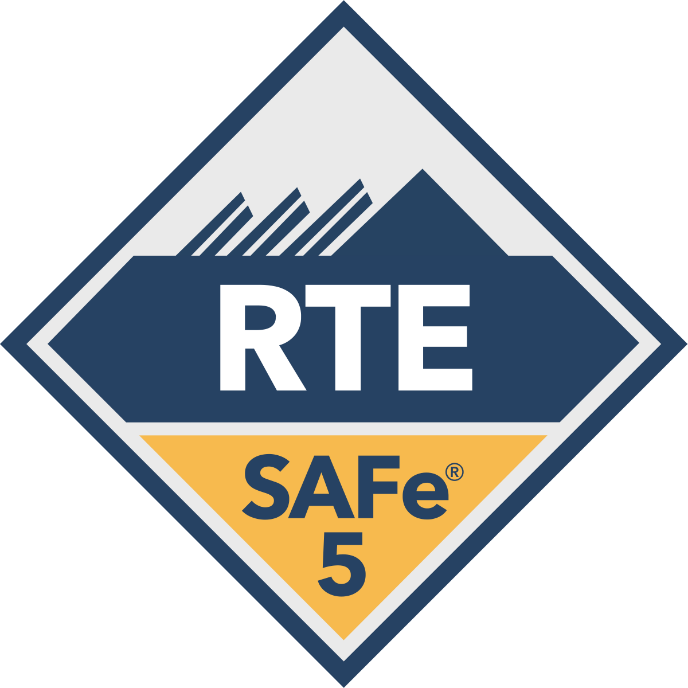
SAFe Release Train Engineer
Facilitating Lean-Agile Program Executionwith Certified SAFe® Release Train Engineer
- Apply Lean-Agile knowledge and tools to execute and release value
- Assist with program and large solution execution
- Foster relentless improvement
- Build a high-performing ART by becoming a servant leader and coach
- Develop an action plan to continue the learning journey
Facilitate and enable end-to-end value delivery through Agile Release Trains (ARTs)—and learn how to build a high-performing ART by becoming a servant leader and coach—when you become a SAFe® 5 Release Train Engineer (RTE).
During this three-day course, gain an in-depth understanding of the role and responsibilities of a Release Train Engineer (RTE) in the SAFe enterprise. Through experiential learning, examine the RTE role in a Lean- Agile transformation. Learn how to facilitate ART processes and execution, coach leaders, teams, and Scrum Masters in new processes and mindsets. Explore how to prepare, plan, and execute a Program Increment (PI) planning event, the primary enabler of alignment throughout all levels of a SAFe organization.
What you get
Becoming a Certified SAFe® Release Train Engineer requires an exceptional range of skills and is a career path for many servant leaders. Certification includes:
- Certified SAFe® Release Train Engineer PDF certificate
- Certified SAFe® Release Train Engineer digital badge to promote your accomplishment online
- One-year membership to the SAFe Community Platform, which includes access to the RTE Community of Practice
- Access to Meetup groups and events that connect you with other SAFe Certified Professionals
- A variety of learning resources to support you during your SAFe journey.
SAFe Product Owner / Product Manager
Delivering value through effective Program Increment execution with Certified SAFe® Product Owner / Product Manager
- Articulate the Product Owner and Product Manager role
- Connect SAFe Lean-Agile principles and values to the PO/PM roles
- Decompose Epics into Features and decompose Features into Stories
- Refine Features into Stories
- Manage Program and Team backlogs
- Collaborate with Agile teams in estimating and forecasting work
- Represent Customer needs in Program Increment Planning
- Execute the Program Increment and deliver continuous value
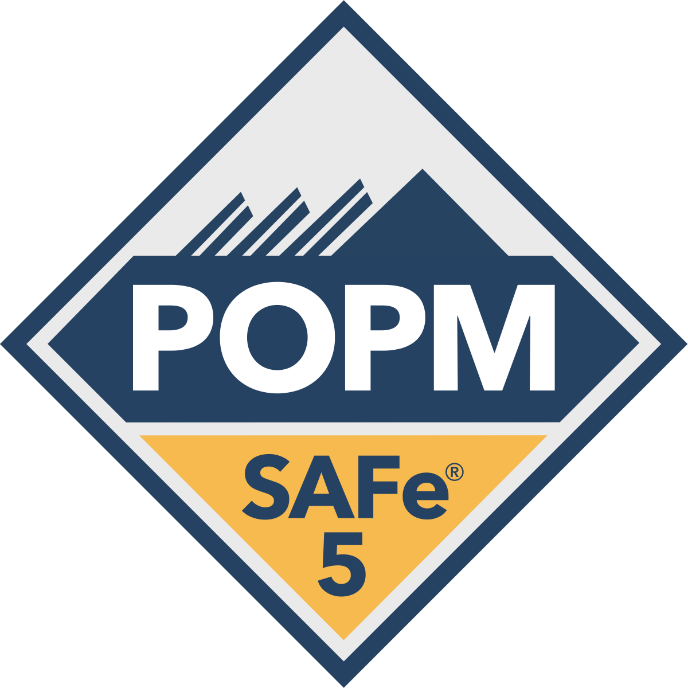
Develop the skillsets needed to guide the delivery of value in a Lean enterprise by becoming a SAFe® 5 Product Owner/Product Manager (POPM). During this two-day course, attendees gain an in-depth understanding of how to effectively perform their role in the Agile Release Train (ART) as it delivers value through Program Increments.
- Attendees explore how to apply Lean thinking to decompose Epics into Features and Stories, refine Features and Stories, manage Program and Team backlogs, and to plan and execute Iterations and Program Increments. Attendees also discover how the Continuous Delivery Pipeline and DevOps culture contribute to the relentless improvement of the ART.
What you get
Becoming a Certified SAFe® Release Train Engineer requires an exceptional range of skills and is a career path for many servant leaders. Certification includes:
- Certified SAFe® Release Train Engineer PDF certificate
- Certified SAFe® Release Train Engineer digital badge to promote your accomplishment online
- One-year membership to the SAFe Community Platform, which includes access to the RTE Community of Practice
- Access to Meetup groups and events that connect you with other SAFe Certified Professionals
- A variety of learning resources to support you during your SAFe journey.
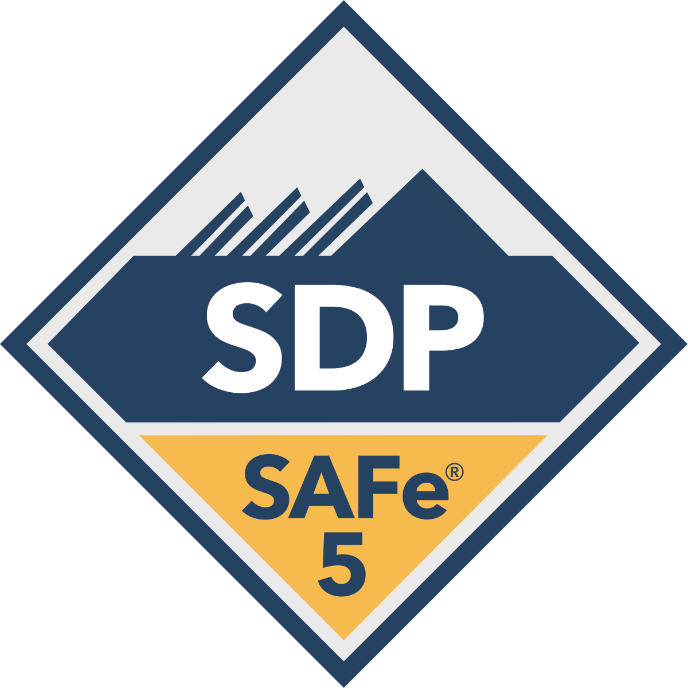
SAFe DevOps
Optimizing Your Value Stream with Certified SAFe® DevOps Practitioner
- Explain how DevOps enables strategic business objectives
- Apply a CALMR approach to DevOps to avoid automating broken processes
- Understand how successful DevOps requires continuous exploration, continuous integration, continuous deployment, and the ability to release to end users on demand
- Incorporate continuous testing and continuous security into the delivery pipeline
- Use value stream mapping to measure flow and identify bottlenecks in the end-to-end delivery process
- Select DevOps skills and tools strategically for the fastest, most compelling results
- Prioritize DevOps solutions and investments for greatest economic benefit
- Design and implement a multi-phased DevOps transformation plan tailored to their organization
- Work with all roles and levels in the organization to continually optimize the value stream
Facilitate and enable end-to-end value delivery through Agile Release Trains (ARTs)—and learn how to build a high-performing ART by becoming a servant leader and coach—when you become a SAFe® 5 Release Train Engineer (RTE).
During this three-day course, gain an in-depth understanding of the role and responsibilities of a Release Train Engineer (RTE) in the SAFe enterprise. Through experiential learning, examine the RTE role in a Lean- Agile transformation. Learn how to facilitate ART processes and execution, coach leaders, teams, and Scrum Masters in new processes and mindsets. Explore how to prepare, plan, and execute a Program Increment (PI) planning event, the primary enabler of alignment throughout all levels of a SAFe organization.
What you get
Becoming a Certified SAFe® Release Train Engineer requires an exceptional range of skills and is a career path for many servant leaders. Certification includes:
- Certified SAFe® Release Train Engineer PDF certificate
- Certified SAFe® Release Train Engineer digital badge to promote your accomplishment online
- One-year membership to the SAFe Community Platform, which includes access to the RTE Community of Practice
- Access to Meetup groups and events that connect you with other SAFe Certified Professionals
- A variety of learning resources to support you during your SAFe journey.
SAFe for Government
Applying Lean-Agile practices in the public sector with the SAFe® with Certified SAFe® Government Practitioner
- Transition government programs from traditional software and systems development models to Lean-Agile and DevOps mindset, principles, and practices using SAFe
- Adapt technology strategy, budgeting and forecasting, acquisition, compliance, and governance processes to flow-based practices using emerging government guidelines
- Organize government programs into one or more Agile Release Trains (ARTs) and execute in Program Increments (PIs)
- Explore Large Solution coordination in a government and multi-vendor environment
- Identify and internalize the mindset and leader behaviors essential to successful Lean-Agile transformation
- Follow success patterns for SAFe implementations adapted to the government context
- Build a preliminary outline of next steps to begin and/or accelerate the SAFe implementation in your program or agency
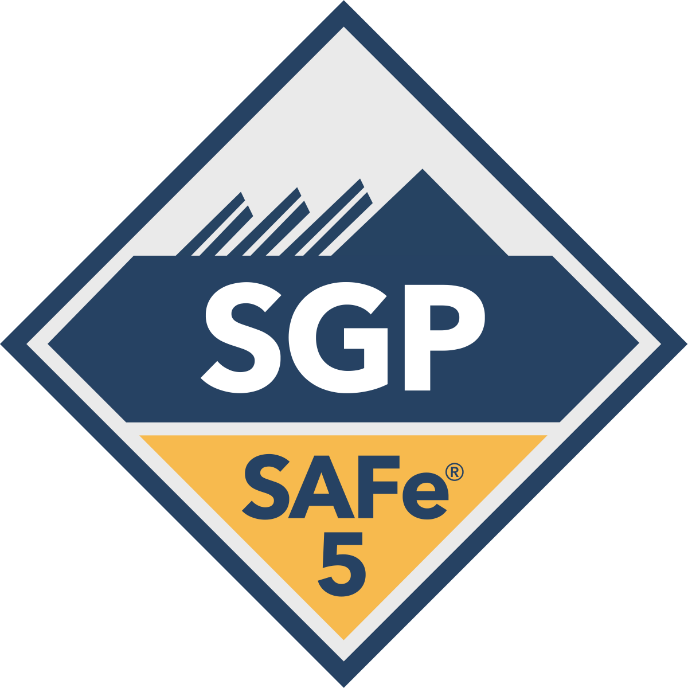
Transitioning to Lean-Agile practices for building technology-based capabilities is especially challenging in the government context.
But issues of legacy governance, contracting, and organizational barriers can be overcome with the right information and strategies. During this two-day course, attendees will learn the principles and practices of the Scaled Agile Framework® (SAFe®), how to execute and release value through Agile Release Trains, and what it means to lead a Lean-Agile transformation of a program inside a government agency.
Attendees gain an understanding of the Lean-Agile mindset and why it’s an essential foundation for transformation. They’ll also get practical advice on building high performing, multi-vendor Agile teams and programs, managing technology investments in Lean flow, acquiring solutions with Agile contracting, launching the program, and planning and delivering value using SAFe. Attendees also learn how specific leadership behaviors can drive successful organizational change in government.
What you get
Becoming a Certified SAFe® Release Train Engineer requires an exceptional range of skills and is a career path for many servant leaders. Certification includes:
- Certified SAFe® Release Train Engineer PDF certificate
- Certified SAFe® Release Train Engineer digital badge to promote your accomplishment online
- One-year membership to the SAFe Community Platform, which includes access to the RTE Community of Practice
- Access to Meetup groups and events that connect you with other SAFe Certified Professionals
- A variety of learning resources to support you during your SAFe journey.
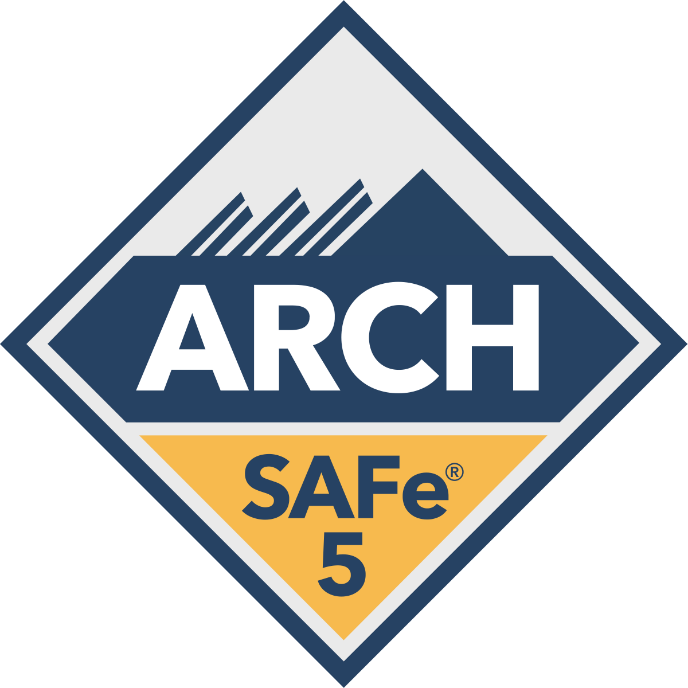
SAFe for Architects
Architecting for continuous value flow with SAFe® with Certified SAFe® Architect
- Architect using SAFe principles
- Align architecture with business value
- Develop and communicate architecture vision and intent
- Plan architectural runway to enable delivery success
- Architect for continuous delivery and Release on Demand
- Lead and coach architects and team members during Program Increment (PI) Planning and execution
- Provide leadership during a Lean-Agile transformation
Attendees can improve collaboration and alignment in a SAFe® Lean-Agile enterprise when they become a SAFe 5 Architect. The SAFe® for Architects course prepares System, Solution, and Enterprise Architects to engage across the organization as effective leaders and change agents who collaboratively deliver architectural solutions.
During this three-day course, attendees will explore the roles, responsibilities, and mindset of Agile Architects, and appreciate how to align architecture with business value and drive continuous flow to large systems-of-systems while supporting SAFe program execution.
This course is for senior technical contributors who need to understand the role of System, Solution, and Enterprise Architects in Lean-Agile enterprises. The course is also appropriate for individuals desiring a deeper view into how architecture enables continuous value flow and how architects engage in, and contribute to, a Lean-Agile enterprise.
What you get
Becoming a Certified SAFe® Release Train Engineer requires an exceptional range of skills and is a career path for many servant leaders. Certification includes:
- Certified SAFe® Release Train Engineer PDF certificate
- Certified SAFe® Release Train Engineer digital badge to promote your accomplishment online
- One-year membership to the SAFe Community Platform, which includes access to the RTE Community of Practice
- Access to Meetup groups and events that connect you with other SAFe Certified Professionals
- A variety of learning resources to support you during your SAFe journey.
Agile Software Engineering
Enabling Technical Agility for the Lean Enterprise with Certified SAFe® Agile Software Engineer
- Define Agile Software Engineering and the underlying values, principles, and practices
- Apply the Test-First principle to create alignment between tests and requirements
- Create shared understanding with Behavior-Driven Development (BDD)
- Communicate with Agile modeling
- Design from context for testability
- Build applications with code and design quality
- Utilize the test infrastructure for automated testing
- Collaborate on intentional architecture and emergent design
- Apply Lean-Agile Principles to optimize the flow of value
- Create an Agile Software Engineering plan
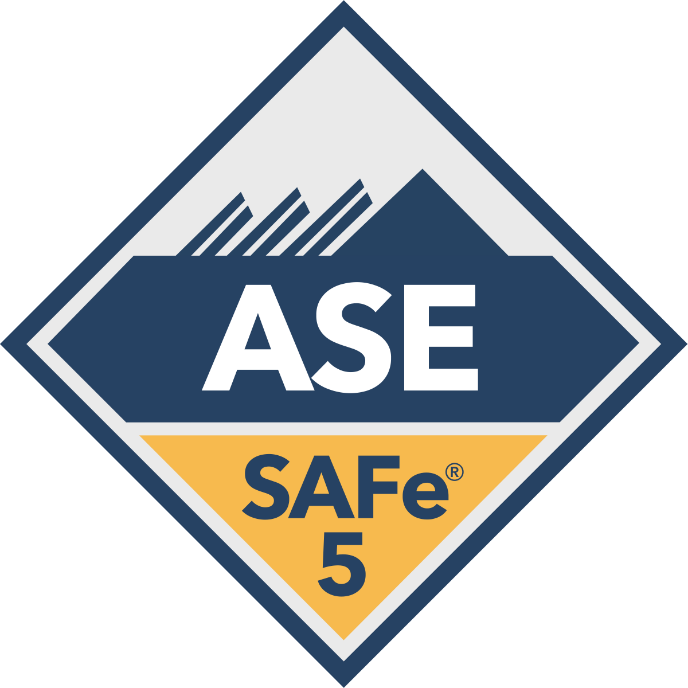
The discipline of software engineering has evolved with the introduction of Lean-Agile and DevOps principles and practices. New skills and approaches help organizations deliver software-centric solutions faster, more predictably, and with higher quality.
During this three-day, workshop-oriented course, attendees learn the foundational principles and practices that make up the Agile Software Engineering discipline. Attendees learn how continuous flow of value delivery and built-in quality are enabled by modern practices including XP technical practices, Behavioral-Driven Development (BDD), and Test-Driven Development (TDD).
Attendees learn proven practices to detail, model, design, implement, verify, and validate stories in a SAFe Continuous Delivery Pipeline. They will know the practices that build quality into code (abstraction, encapsulation, intentional programming) and designs (SOLID, Design patterns). Attendees also understand how Software Engineering fits into the larger solution context and their role in collaborating on intentional architecture and DevOps.
What you get
Becoming a Certified SAFe® Release Train Engineer requires an exceptional range of skills and is a career path for many servant leaders. Certification includes:
- Certified SAFe® Release Train Engineer PDF certificate
- Certified SAFe® Release Train Engineer digital badge to promote your accomplishment online
- One-year membership to the SAFe Community Platform, which includes access to the RTE Community of Practice
- Access to Meetup groups and events that connect you with other SAFe Certified Professionals
A variety of learning resources to support you during your SAFe journey
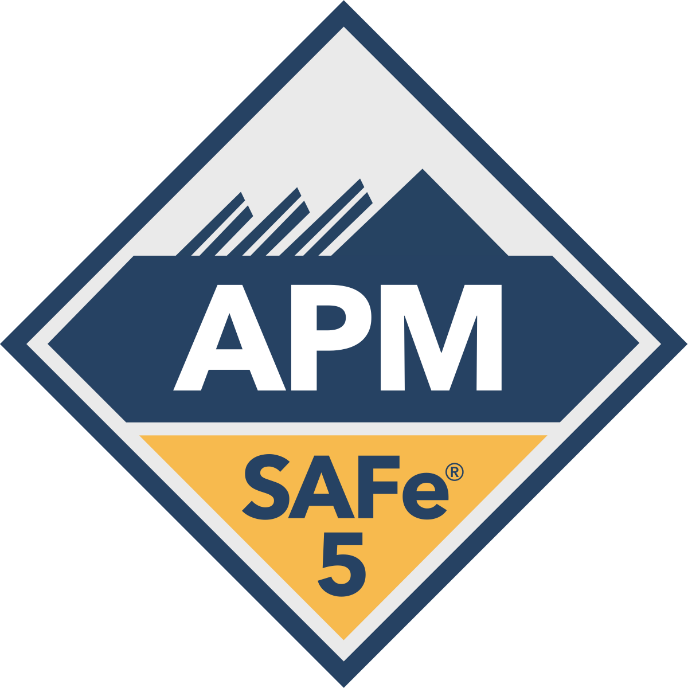
Agile Product Management
Using Design Thinking to create valuable products in the Lean Enterprise with Certified SAFe® Agile Product Manager
- Use Design Thinking to achieve desirable, feasible, and sustainable outcomes
- Explore market needs, segmentation, sizing and competitive landscape
- Manage value stream economics, including pricing and licensing
- Use empathy to drive design
- Apply product strategy and vision
- Develop and evolve roadmaps
- Execute and deliver value using SAFe
- Explore innovation in the value stream
The Agile Product Management course harnesses the power of Design Thinking to develop innovative solutions with proven SAFe capabilities to execute on those visions. Learn the right mindset, skills, and tools to create successful products—from inception to retirement—using Agile techniques.
Recognize how Continuous Exploration fuels innovation and helps you define a vision, strategy, and roadmap to tap into new markets. Find out how to accelerate the product life cycle to get fast feedback and quickly deliver exceptional products and solutions that delight customers—all while aligning with your organization’s strategy, portfolio, evolving architecture, and solution intent.
What you get
Becoming a Certified SAFe® Release Train Engineer requires an exceptional range of skills and is a career path for many servant leaders. Certification includes:
- Certified SAFe® Release Train Engineer PDF certificate
- Certified SAFe® Release Train Engineer digital badge to promote your accomplishment online
- One-year membership to the SAFe Community Platform, which includes access to the RTE Community of Practice
- Access to Meetup groups and events that connect you with other SAFe Certified Professionals
A variety of learning resources to support you during your SAFe journey.
Lean Portfolio Management
Aligning strategy with execution with Certified SAFe® Lean Portfolio Manager
- Describe Lean Portfolio Management (LPM)
- Connect the portfolio to enterprise strategy
- Establish the Portfolio Vision
- Implement Lean Budgeting and Guardrails
- Establish flow with the Portfolio Kanban
- Support operational excellence with an Agile Program Management Office (PMO) and Communities of Practice (CoPs)
- Coordinate Value Streams
- Measure LPM performance
- Build a plan for LPM implementation
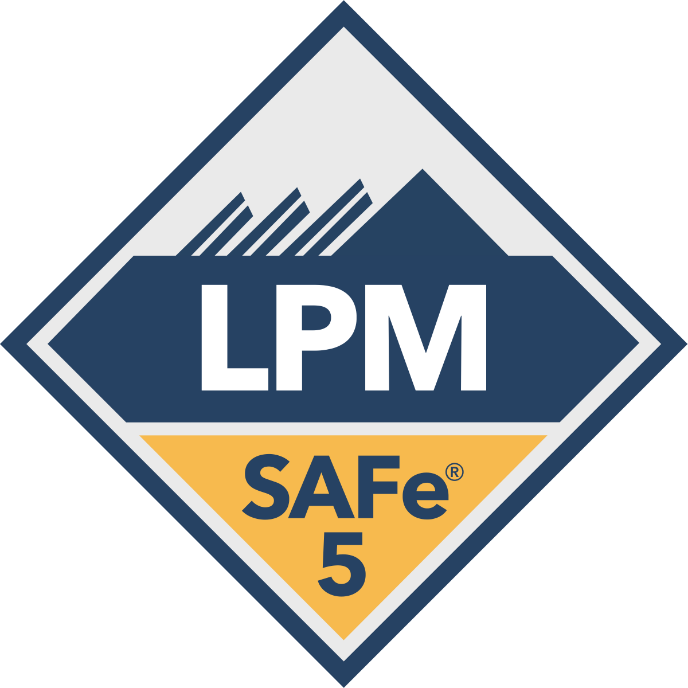
In this three-day workshop style course, attendees gain the practical tools and techniques necessary to implement the Lean Portfolio Management functions of Strategy and Investment Funding, Agile Portfolio Operations and Lean Governance.
Participants in the course have the opportunity to capture the current and the future state of their portfolio with the Portfolio Canvas tool and identify important business initiatives for achieving the future state. Participants also explore methods to establish portfolio flow with the Portfolio Kanban and prioritize initiatives for maximum economic benefit. The course also provides insights on how to establish Value Stream Budgets and Lean Budget Guardrails and measure the Lean portfolio performance..
What you get
Becoming a Certified SAFe® Release Train Engineer requires an exceptional range of skills and is a career path for many servant leaders. Certification includes:
- Certified SAFe® Release Train Engineer PDF certificate
- Certified SAFe® Release Train Engineer digital badge to promote your accomplishment online
- One-year membership to the SAFe Community Platform, which includes access to the RTE Community of Practice
- Access to Meetup groups and events that connect you with other SAFe Certified Professionals
- A variety of learning resources to support you during your SAFe journey.
DevOps
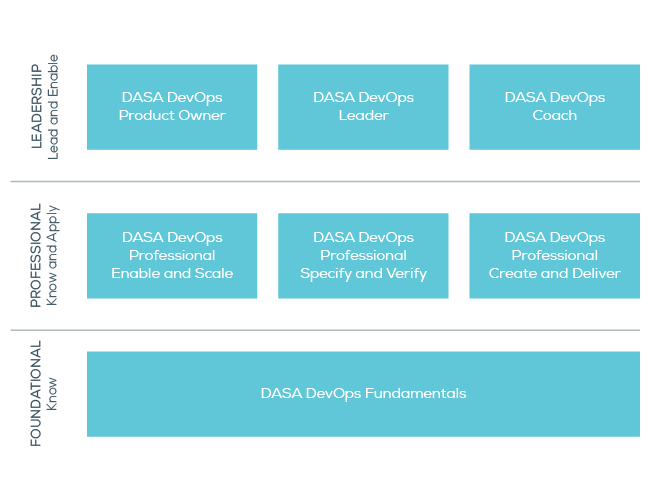
Fundamentals
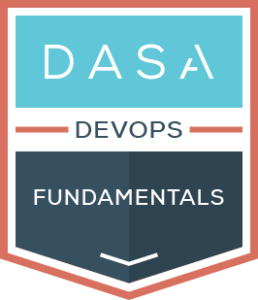
DevOps Fundamentals
The DASA DevOps Fundamentals certification provides an extensive introduction to the core agile DevOps principles covering the essential knowledge and skill competences that have been defined by DASA.
At the end of this course, you will be able to:
-
- Explain the drivers responsible for the emergence of DevOps.
- Define and discuss the key concepts and principles of DevOps.
- List and explain the business benefits of DevOps and continuous delivery.
- Describe the Service Delivery process.
- Explain the concepts of test automation, infrastructure automation, and build and deployment automation.
- Describe how DevOps relates to Lean and Agile methodologies.
- Summarize case studies of IT organizations that are making the transformation to Adaptive IT and DevOps models.
- List the most common and popular DevOps tools.
- Discuss the critical success factors for DevOps implementation.
Professional
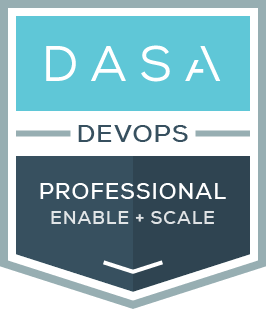
DevOps Professional - Enable & Scale
The DASA DevOps Professional Enable and Scale certification validates that the candidate has a practical understanding and experience in leading DevOps teams and enables members to become effective ensuring the team works optimally. DASA recognizes four major skill areas: Courage, Team-building, DevOps Leadership, and Continuous Improvement.
When you have acquired the required knowledge from this course, you will be able to:
-
- Explain the importance of DevOps culture and the aspects that can influence it.
- Explain why courage, team building, leadership, and continuous improvement are required in a DevOps environment.
- Explain why courage is essential to enable trust, honesty, and experimentation.
- Identify and evaluate different types of behavior in a DevOps environment.
- Recognize the signals indicating impediments and/or team dysfunctions.
- Describe how to form good DevOps teams.
- List the effects of happiness and motivation on team performance.
- Assess the maturity of DevOps teams.
- Identify how leaders encourage feedback and transparency.
- Discuss the factors that leaders can influence to build trust.
- Explain how and why leaders promote a “Safe to fail” environment.
- Analyze value streams to improve throughput and flow.
- Facilitate the tools for continuous improvement: structured problem-solving workshops, Story Mapping sessions, and retrospectives.
DevOps Professional - Specify & Verify
The DASA DevOps Professional specify and Verify certification focuses on ensuring that the requirements of the customers are fully understood and brought into the team so that these requirements can be integrated into the IT product or service being delivered by the team. The following knowledge areas are covered: Business Value Optimization, Business Analysis, Architecture & Design, and Test Specification.
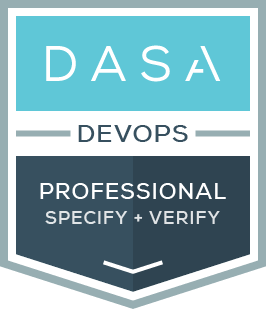
When you have acquired the required knowledge from this course, you will be able to:
-
- Understand how the tasks covering specification and verification fit into a DevOps environment.
- Take end-to-end responsibility for your product – from concept to grave.
- Truly understand your customers and validate whether the product fits their needs.
- Find good ways to communicate with everyone involved, from customers to stakeholders and developers.
- Describe and visualize your product in a format that fits your specific situation.
- Understand what software quality means and how to achieve adequate quality with your product.
- Decide adequately which kind of tests the product needs, and understand what you gain from them.
- Set up useful feedback loops, and use them meaningfully.
- Understand which architectural considerations are important in a DevOps environment.
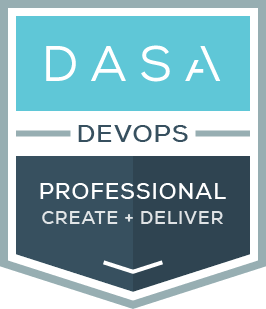
DevOps Professional - Create & Deliver
The DASA DevOps Professional create and deliver certification addresses the heart of a DevOps team, as it focuses on Programming, Continuous Delivery, Security, Risk & Compliance and Infrastructure Engineering. Most team members will have this profile, and be interested in this certification.
Leadership
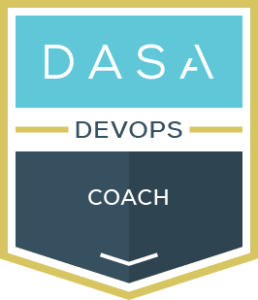
DevOps - Coach
The DevOps Coach helps team members and other stakeholders in the organization apply DevOps concepts and principles within their organization. The coach oversees the transformation and guides the organization through their journey in building high performing teams.
When you have acquired the required knowledge from this DevOps Coach certification program, you will be able to:
-
- Recollect the knowledge of DevOps and connect the role of a DevOps Coach to the DASA DevOps Principles
- Comprehend the mindset and role of a DevOps Coach
- Understand the characteristics, structures, and life-cycles of DevOps teams and how to Coach them to high-performance
- Learn using the GROW model as an effective tool during the entire coaching process
- Discover and learn the art of “Feedback” and creating a feedback culture using various “Feedback” models
- Learn about DevOps transformation mastery
- Distinguish the responsibilities of “DevOps Coach” and “DevOps Leader”
- Understand that DASA DevOps Coaching is for continuous “Performance” and “Change” – and understand underlying the metrics.
- Learn skills, techniques and mindset shifts and deep dive into inner and outer competencies focusing both what you do, and how you are being
- Understand and utilize coaching skills and knowledge to create high performing teams that are resilient, innovative, resourceful and ready for their continuous improvements
- Understand the 4 different key modes: Coaching, Mentoring, Facilitation & Consulting. Learn when, why and how to apply the right mode
- Apply learnings to build a business case and plan for the DevOps Transformation journey
- Interpret the DevOps organizational goals and establish the critical role high performing teams have in this
DevOps - Product Owner
In a DevOps environment, the Product Owner is a critical leadership role and responsible for managing the full lifecycle of a product from concept to grave. This certification program helps the Product Owner realize maximum business value, engage with stakeholders, and deal with future requirements as well as operational challenges.
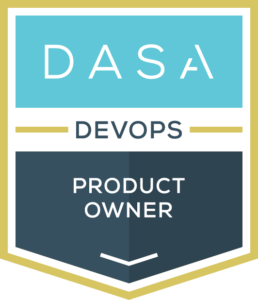
When you have acquired the required knowledge from this DevOps certification program, you will be able to:
-
- Understand the concepts of Agile and Scrum.
- Understand the Scrum framework including roles, events, the importance of backlog and the definition of done.
- Understand the role of Product Owner.
- Discuss the role and characteristics of the DevOps team.
- Explain the main competencies of the Product Owner.
- Describe what a Product Owner does in practice.
- Explain the Product Owner’s work.
- Discuss the importance of delivering value.
- Identify the Product Vision techniques.
- Discuss how to engage and influence stakeholders to maximize value.
- Outline various Agile estimation techniques used by Product Owners.
- Explain the role of Product Owner in managing Product Backlog.
- Discuss few challenging situations of a Product Owner.
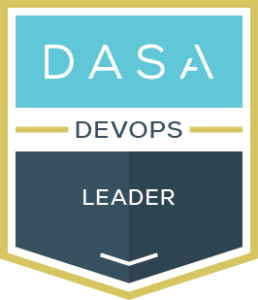
DevOps - Leader
The DevOps Leader is responsible for leading the DevOps initiative, and creating the framework for teams to scale and achieve maximum business value. This certification program helps leaders understand leadership in the context of DevOps, discusses leadership development models, building teams, and transforming the organization.

